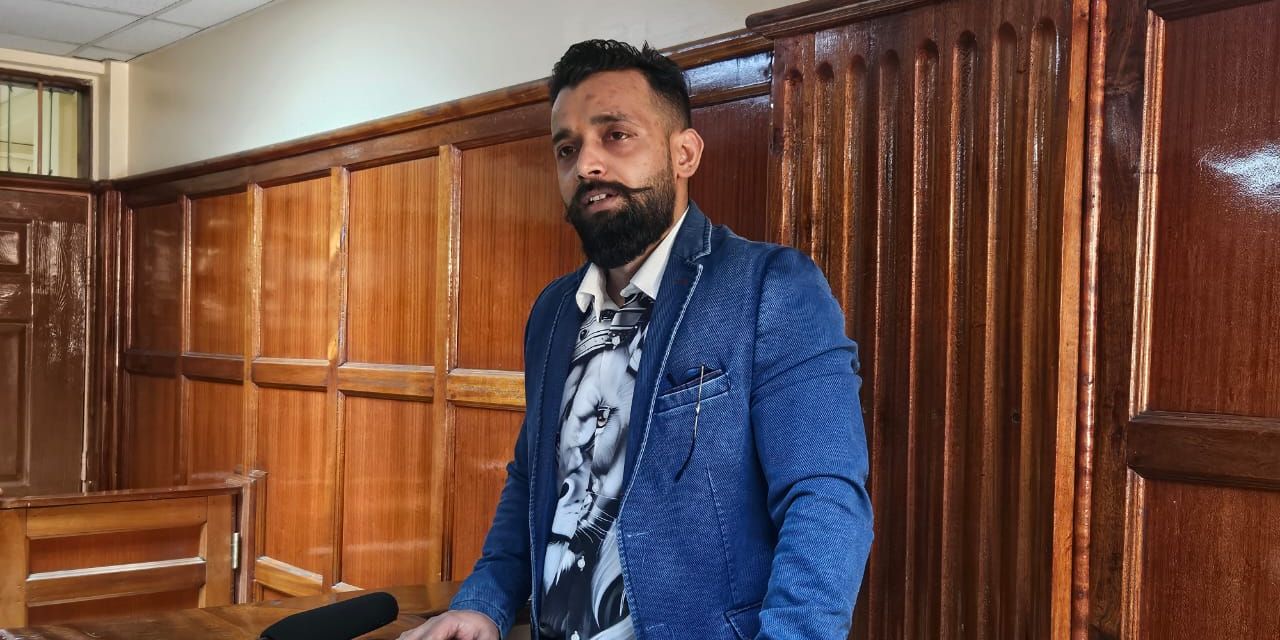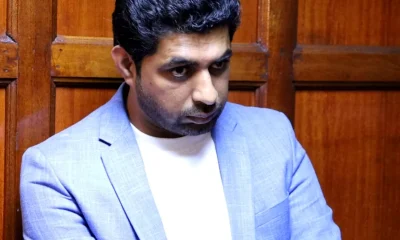Business
Elaborate Con: How KRA Busted Baba Dogo Firm in Sh810M Tax Evasion Scam
Industry insiders familiar with Oki’s modus operandi describe a company that has perfected the art of the “shell shuffle”—constantly rotating transactions through dormant companies with outstanding tax obligations to make tracking liabilities nearly impossible.

Ruaraka-based Oki General Trading now fighting for survival as taxman unmasks elaborate scheme involving ghost companies, missing customs duties, and brazen theft of public funds
In what investigators are calling one of the most audacious tax fraud schemes to hit Kenya’s fragile economy, the Kenya Revenue Authority has cornered Oki General Trading Limited—a Baba Dogo area firm masquerading as a legitimate procurement company in an eye-watering Sh827 million tax evasion racket that has left the taxman scrambling to recover stolen public funds.
The elaborate con, which investigators say was executed with surgical precision over four years, involved a sophisticated web of phantom transactions, manipulated import declarations, and systematic looting disguised as “business withdrawals” by directors who treated Kenya’s tax system like their personal ATM.
At the heart of this financial heist sits Oki General Trading Kenya Limited, a Ruaraka-based outfit that has now been dragged before the Tax Appeals Tribunal after KRA’s forensic audit ripped apart the veneer of legitimacy and exposed what investigators describe as “brazen economic sabotage.”
The numbers are staggering.
Between October 2020 and December 2024, the firm allegedly evaded Corporate Income Tax of Sh162.9 million on what KRA terms “ghost stock”—inventory that mysteriously appeared in financial statements but had no corresponding import documentation or customs clearance.
Another Sh53.4 million in corporate tax vanished through disallowed import costs and VAT-exempt purchases that investigators say were fabricated to inflate expenses and shrink tax liability.
But the real smoking gun emerged when KRA forensic teams combed through bank statements from Ecobank and Absa Bank.
What they found was jaw-dropping: a staggering Sh604.6 million withdrawn by four individuals—Honey Katwani, Anil Kumar Ramchandani, Jatin Aswani, and Jayesh Soni in what the company laughably claims were “petty cash disbursements” for office supplies and employee lunches.
Petty cash running into over half a billion shillings? KRA wasn’t buying it.
The taxman immediately slapped a PAYE assessment of Sh216.4 million on these withdrawals, arguing that the funds constituted undeclared employment income. Oki General Trading’s defense that these were business expenses for buying staplers and samosas has been dismissed by tax investigators as insulting to public intelligence.
“These were not business expenses. This was systematic theft dressed up in accounting jargon,” a senior KRA official told Kenya Insights on condition of anonymity.
“When you withdraw over Sh600 million and call it petty cash, you’re either running the world’s most expensive stationery shop or you’re stealing from Kenyans.”
The scandal deepens with the firm’s alleged connection to a murky network of shell companies, particularly Satnam Limited, through which investigators say millions in fraudulent transactions were channeled to evade detection.
KRA has assessed additional VAT of Sh5.7 million and Corporate Income Tax of Sh10.8 million on sales that Oki allegedly understated by routing them through Satnam.
Oki vehemently denies any link to Satnam, claiming instead that one of its former directors, Honey Khatwani—the same man featured prominently in those mysterious Sh604 million withdrawals—actually stole Sh356 million from the company and funneled it through various entities including Satnam Limited.
The plot thickens: Khatwani is currently facing criminal charges, and the High Court has already entered judgment against him, ordering him, his wife, and two associates to repay Sh362.2 million.
Yet somehow, Oki expects Kenyans to believe that the same director they now accuse of theft was making legitimate “petty cash” withdrawals from their accounts for years without raising red flags.
The contradictions are glaring.
If Khatwani was a thief, why was he allowed unfettered access to company accounts? Why did Oki’s internal controls—assuming any existed not detect over half a billion shillings walking out the door? And why is the company now fighting tooth and nail against paying PAYE on these “stolen” funds?
KRA’s audit also uncovered what appears to be a classic customs fraud scheme.
The authority disallowed imports worth Sh349.2 million, claiming customs duty was never paid.
Additionally, investigators assessed VAT of Sh86.8 million on stock reconciliation variances—the difference between what Oki claimed to have imported and what actually showed up in their warehouses and financial books.
The firm’s response? There were no variances.
The stock matched perfectly. The imports were all legitimate.
But when KRA demanded to see asset registers and proof of ownership for capital allowances claimed, the company couldn’t produce them, resulting in a further Sh2.1 million tax hit.
This is the pattern investigators say defines Oki’s operations: elaborate paperwork when it suits them, missing documentation when scrutiny arrives, and a revolving door of explanations that change depending on which tax liability is being challenged.
The procurement firm, which positions itself as a global logistics player with operations spanning the Middle East, Africa, and Asia, has built its business model around providing “comprehensive procurement solutions” for everything from foodstuffs to relief supplies in conflict zones.
Yet in Kenya, its operations appear designed around one core competency: exploiting regulatory loopholes to avoid paying what it owes.
Industry insiders familiar with Oki’s modus operandi describe a company that has perfected the art of the “shell shuffle”—constantly rotating transactions through dormant companies with outstanding tax obligations to make tracking liabilities nearly impossible.
Import documentation filed under one entity would mysteriously migrate to another within days, erasing the paper trail and shielding the real beneficiaries from accountability.
“They operate like a three-card monte game,” said one customs clearing agent who requested anonymity. “By the time KRA figures out which company actually imported the goods, the duty has been grossly underpaid and the merchandise is already in the market.”
The Satnam connection is particularly revealing. According to investigations exposed in multiple media reports earlier this year, Oki was linked to a sophisticated scheme involving the illegal importation of perfumes worth over USD 300,000—approximately Sh39 million—which were fraudulently cleared into Kenya with only Sh2 million in duty paid.
The initial entry was filed under Satnam Limited, a company drowning in unpaid taxes.
Almost immediately, the documentation was transferred to Satnam Kenya Investment Limited, conveniently shielding the transaction from scrutiny.
Investigators describe this as textbook Rajoriya strategy—named after Deepak Rajoriya, Oki’s director, who along with associate Karan Badlani has been implicated in what authorities call a systematic campaign to defraud Kenya’s tax system.
Badlani himself presents another red flag.
The Satnam director reportedly lived and operated in Kenya for over two and a half years without a valid visa, openly flouting immigration and tax laws while conducting business with apparent impunity.
That he managed to do so raises disturbing questions about regulatory capture and whether Oki’s network enjoyed protection from oversight authorities.
The economic cost of schemes like Oki’s cannot be overstated.
Every shilling evaded is a shilling stolen from hospitals, schools, roads, and the social services that ordinary Kenyans desperately need.
While directors withdraw hundreds of millions for “petty cash,” patients die in understaffed health facilities and children learn under trees because county governments cannot afford classrooms.
This is not victimless crime. This is economic terrorism.
Oki General Trading’s decision to challenge KRA’s assessment before the Tax Appeals Tribunal is its legal right.
But the optics are terrible.
A company that claims to have been robbed of Sh356 million by its own director is simultaneously fighting not to pay taxes on Sh604 million that same director and his associates withdrew.
A firm that insists its books are clean cannot produce basic documentation like asset registers when auditors come calling.
The case now before the Tribunal will test whether Kenya’s tax justice system has the teeth to hold accountable firms that treat compliance as optional and taxpayers as fools.
Oki is challenging virtually every aspect of KRA’s Sh827 million assessment—from the PAYE on director withdrawals to the VAT on phantom stock variances to the customs duty on imports that may never have been properly declared.
The company’s defense boils down to this: Trust us. Our books are accurate.
The withdrawals were legitimate business expenses. The imports were all properly cleared. The stock variances don’t exist. And any evidence suggesting otherwise is a misapplication of law and fact by KRA.
But trust, in tax matters, must be earned through transparency, documentation, and consistent compliance. Oki General Trading’s track record suggests none of these exist.
As this case grinds through the appeals process, Kenyans watching will wonder: How many other firms are running similar schemes? How much revenue is bleeding from the economy while companies play shell games with tax obligations? And most importantly, will anyone actually be held accountable, or will this end with a negotiated settlement that allows the perpetrators to pay a fraction of what they owe and return to business as usual?
The Kenya Revenue Authority, for its part, appears determined to make an example of Oki.
The Sh827 million assessment, revised upward from the initial Sh810 million demand, sends a clear message: the days of treating Kenya as a tax haven for connected operators are over.
Whether the Tax Appeals Tribunal agrees remains to be seen. But one thing is certain—the spotlight is now squarely on Oki General Trading Limited, and the harsh glare of scrutiny is revealing a company whose explanations for how it does business raise far more questions than they answer.
For a firm that claims to operate with integrity across three continents, its Kenyan operations increasingly resemble a masterclass in creative accounting, strategic amnesia, and brazen contempt for tax law.
The Tribunal’s decision will determine whether Kenya’s economy continues to be drained by operators who view compliance as a nuisance, or whether the era of unchecked tax evasion has finally met its reckoning in Baba Dogo.
Kenya Insights allows guest blogging, if you want to be published on Kenya’s most authoritative and accurate blog, have an expose, news TIPS, story angles, human interest stories, drop us an email on [email protected] or via Telegram
-

 Grapevine2 weeks ago
Grapevine2 weeks agoRussian Man’s Secret Sex Recordings Ignite Fury as Questions Mount Over Consent and Easy Pick-Ups in Nairobi
-

 News7 days ago
News7 days agoTHE FIRM IN THE DOCK: How Kaplan and Stratton Became the Most Scrutinised Law Firm in Kenya
-

 Investigations1 week ago
Investigations1 week agoMulti-Million Dollar Fraud: Three Kenyans Face US Extradition in Massive Cybercrime Conspiracy
-

 Economy1 week ago
Economy1 week agoIran Demands Arrest, Prosecution Of Kenya’s Cup of Joe Director Director Over Sh2.6 Billion Tea Fraud
-

 Business1 week ago
Business1 week agoA Farm in Kenya’s Rift Valley Ignites a National Reckoning With Israeli Investment
-

 Africa1 week ago
Africa1 week agoFBI Investigates Congresswoman Ilhan Omar’s Husband’s Sh3.8 Billion Businesses in Kenya, Somalia and Dubai
-

 Grapevine3 days ago
Grapevine3 days agoA UN Director Based in Nairobi Was Deep in an Intimate Friendship With Epstein — He Even Sent Her a Sex Toy
-

 Politics2 weeks ago
Politics2 weeks agoSifuna, Babu Owino Are Uhuru’s Project, Orengo Is Opportunist, Inconsequential in Kenyan Politics, Miguna Says

























